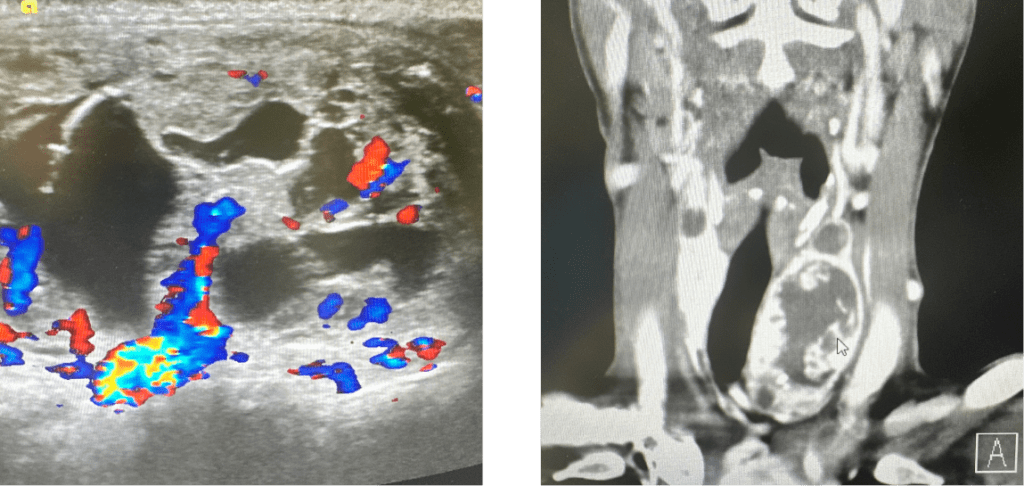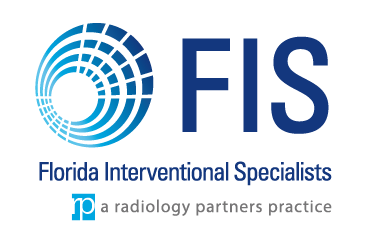Percutaneous Image Guided Ablation of Thyroid Nodule

The thyroid is a gland at the front of the neck. Nodules can sometimes form inside the thyroid gland. You may notice a bump in the gland area. Thyroid nodules are common and often are not dangerous. But in some cases they can be large resulting in symptoms such as difficulty swallowing, discomfort, cough or cosmetic problems. In these cases, ablation may be indicated to treat the nodule. A biopsy to rule out cancer is performed before a ablation can be considered. Thyroid cancers under 1 cm in diamter can also be treated with ablation.
Getting ready for your procedure
Talk with your healthcare provider about how to get ready. Tell them about all the medicines you take. This includes over-the-counter medicines such as ibuprofen, vitamins, herbs, and other supplements. You may need to stop taking some medicines before the procedure, such as blood thinners and aspirin. You should be able to eat and drink normally before the procedure.
Risks of ablation for thyroid nodule
All procedures have some risks. The risks of ablation of thyroid nodules include:
· Bleeding at the site
· Infection
· Damage to areas near the thyroid (rare)
· Hypothyroidism (less than 1%)
· Voice changes (typically resolves in a few days to weeks)
· Pressure or pain in neck, jaw, chest that may last a few hours
On the day of your procedure
Your procedure may be done in a hospital or a medical clinic. You should be able to go home the same day. The procedure often goes like this:
· You may be given a medicine to help you relax, if needed. Arrange for a ride home if you are given medicines that make you sleepy.
· You will most likely be lying on your back for the procedure, with a pillow under your shoulders to extend your neck.
· Your healthcare provider may use an ultrasound machine during the biopsy. This machine uses sound waves and a computer to show live images of the tissues in your neck. This helps your healthcare provider guide the needle to the right spot. A gel will be put on your neck. This helps the ultrasound wand maintain contact with your skin and enhances the signal made by the sound waves.
· The area will be cleaned. A local anesthetic (numbing medicine) will be injected in the area in the front of your neck. A thin, fine (narrow) needle will be put through your skin and into your thyroid gland if you are getting laser treatment. If not, the ablation probe (Microwave or RFA) will be advanced directly into the nodule. You may feel a small amount of pain or pressure. The needle will be gently pushed and retracted into the nodule. You will need to be very still. You should try to not cough, talk, or swallow during the procedure while the needle is in place.
· If you are getting laser, a fiber optic is placed through the needle into the nodule that delivers energy resulting in the ablation of the nodule.
· The needle will then be taken out. A small bandage will be put on the needle insertion site.
· Sometimes the healthcare provider will use the ultrasound wand again 15 to 30 minutes later. This is to check that there is no bleeding or swelling where the ablation was done.
Post procedure home care
Here are some tips to take care of yourself at home:
· Eating, drinking and normal activities can be resumed as normal
· You will have a small adhesive bandage on your biopsy site. Leave the bandage on for 4 to 6 hours. After this time, you don’t need to keep it covered. You may shower as normal after 24 hours. Avoid being submerged in water such as swimming, tub bathing, or hot tub for several days following your procedure.
· The numbing medicine will wear off within 2-3 hours
· If you feel discomfort after the biopsy, take over-the-counter pain medicine such as Tylenol (acetaminophen). Don’t take aspirin or ibuprofen (i.e., NSAIDs such as Motrin, Aleve, and Naproxen) for 24 hours. It’s normal to feel sore for a day or 2.
· If you are taking a blood thinner, please follow recommendations from your primary care provider or Cardiologist on resuming after procedure.
Other resources:
THE SERVICES LISTED ON THIS WEBSITE ARE FOR GENERAL INFORMATION PURPOSES ONLY AND DO NOT INCLUDE ALL SERVICES OF FLORIDA INTERVENTIONAL SPECIALISTS. WHILE WE STRIVE TO KEEP THE INFORMATION UP TO DATE AND CORRECT, WE MAKE NO REPRESENTATIONS OR WARRANTIES OF ANY KIND, EXPRESS OR IMPLIED, ABOUT THE CONTENT, COMPLETENESS, ACCURACY, RELIABILITY, LEGALITY, SUITABILITY OR AVAILABILITY, WITH RESPECT TO THE SERVICES CONTAINED ON THIS WEBSITE.
